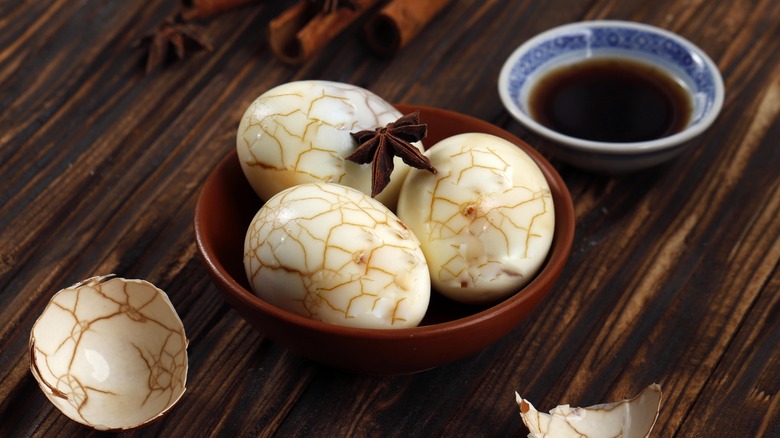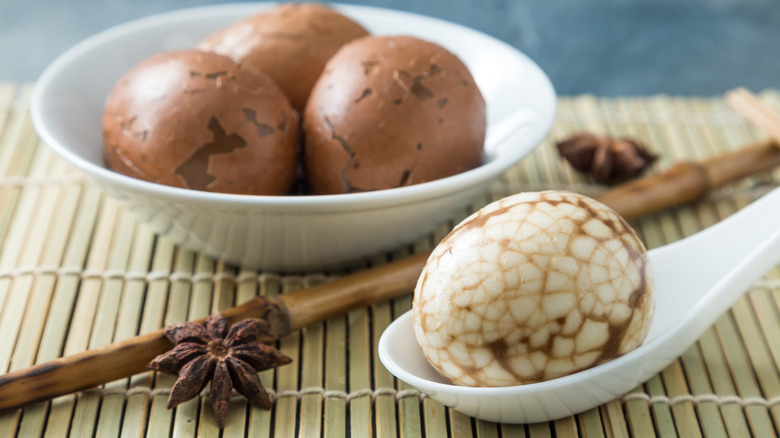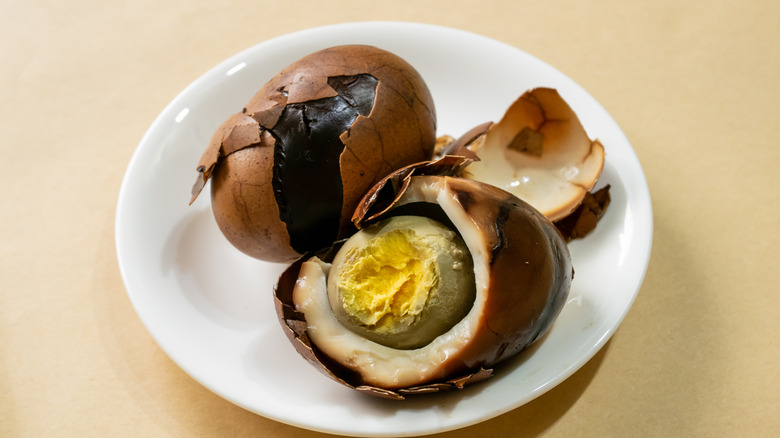Eggs Soft-Boiled In Tea Are Nature's Most Flavorful Breakfast
There are many great ways to cook eggs, but have you heard of tea eggs? They look amazing and have a unique taste that complements savory dishes. The New York Times (NYT) explains that a recipe for tea eggs can be found in the 18th-century book "The Way of Eating" by Yuan Mei, and they have since been popularized in Southeast Asia and beyond. On her blog Omnivore's Cookbook, Maggie Zhu explains that she grew up eating tea eggs in China where they're enjoyed as street food and even found in convenience stores. The Woks of Life adds that tea eggs are often sold by street vendors in the AM hours.
But regardless of when you'd like to eat them, tea eggs are definitely a "make-ahead" dish: Recipes are easy to follow, but they take a long time to prepare. Once you have them on hand, though, you'll have a delicious breakfast, snack, or topping for a wide variety of dishes. Of course, you could also order pre-made tea eggs online, but where's the fun in that? You won't want to miss out on a chance to add tea eggs to your repertoire because they're absolutely stunning, yet so simple to make.
What are tea eggs?
Tea eggs are boiled eggs that are later soaked in a mixture of tea, soy sauce, and "warm" spices like ginger, cinnamon, star anise, and peppercorns. The tea varies but is traditionally a type of black. Some recipes call for cooking wine or vinegar. NYT describes the eggs as having a marbled appearance and an umami flavor. They resemble porcelain or granite because you crack the boiled eggs' shells, but leave them on for the hours-long marinating process. When you peel the eggs afterward, they will be adorned with crackly lines — like brushstrokes from the marinade.
Both the Woks of Life and Maggie Zhu report that authentic Chinese tea eggs are essentially overcooked. Zhu explains that this comes from a double cooking session: first, a hard boil, and then another longer cook in a marinade, which helps preserve them when they can't be kept cold — like on a street vendor's cart. However, this gives the tea eggs a very firm and chewy texture, more like eggs that've been pickled for a long time. Both sources say they prefer a lightly-done white and gooey yolk, similar to the egg you'd add to a traditional bowl of ramen, and their specific tea egg recipes reflect this.
How to make and eat tea eggs
Woks of Life reminds readers to let their eggs sit at room temperature before boiling, so they won't crack in the pot. Prepare your marinade by simmering the other ingredients for about 10 minutes. For soft-boiled eggs, Zhu boils the eggs in water for five minutes and lets them chill in an ice bath for two to three minutes right afterward. For cooked-through yolks, hard boil your eggs. Use the back of a spoon to crack the eggs just enough for the marinade to penetrate, but don't damage the white, Woks of Life warns. Or, remove the shells completely and marinate the eggs peeled for a bolder flavor (per NYT).
Cover your eggs in the cooled marinade and refrigerate them for 12-24 hours. You can change them up by experimenting with different types of tea, such as fragrant Earl Grey or even jasmine. Zhu suggests pairings like rice and soup where the yolk mingles with the broth. Tea eggs would be lovely in hard-boiled egg stuffed biscuits and a refreshing take on classic egg dishes, like Food Network's deviled tea eggs and Better Homes and Gardens's recipe with smoky lapsang souchong tea, smoked salmon, and pink pepper. Tea eggs take little effort to turn out beautifully and offer a fun opportunity to enjoy the ubiquitous egg in a new way.


